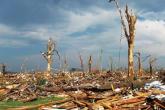After a natural disaster or manmade tragedy, many people react with heightened emotions, such as anxiety, worry, and anger, says the Substance Abuse and Mental Health Services Administration (SAMHSA) Administrator Pamela S. Hyde. Most bounce back with community and family support, she says. But those who need more help in coping with unfolding traumatic events can turn to the Disaster Distress Helpline for immediate crisis counseling.
Related: Perceived Attitudes and Staff Roles of Disaster Management at CBOCs
The helpline connects callers around the clock with trained professionals from the closest crisis-counseling center. The staff provide confidential counseling, referrals, and other needed support services to anyone experiencing psychological distress as a result of mass violence or any other tragedy affecting U.S. communities.
Sponsored by SAMHSA, the helpline complements other services provided by the HHS and the Federal Emergency Management Agency. It is available anywhere in the U.S.
Related: Pre-storm Dialysis Saves Lives
People in need can contact the helpline by calling (800) 985-5990, texting TalkWithUs to 66746, accessing http://disasterdistress.samhsa.gov, or calling TTY for deaf and hearing impaired at (800) 846-8517. The helpline is multilingual.
Related: Power to the Patients
SAMHSA also publishes a downloadable guide, Tips for Survivors: Coping With Grief After Community Violence, with advice for both individuals and communities, available at http://www.samhsa.gov.
